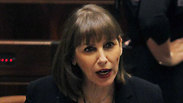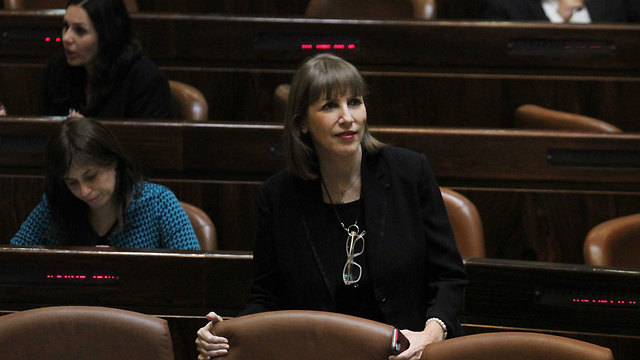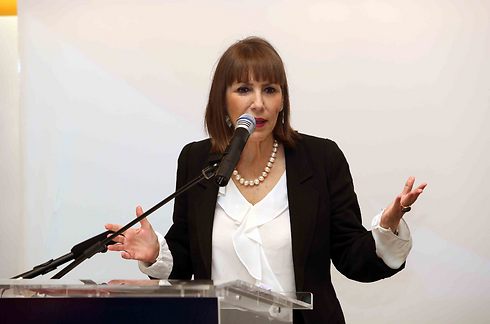
Culture and Sport Minister Livnat retires from political life
Likud minister, whose Knesset career spans over 22 years, tells Netanyahu she will not run in upcoming elections.
Ahead of the Knesset's vote to disband itself on Monday, Culture and Sport Minister Limor Livnat (Likud) told Prime Minister Benjamin Netanyahu that she was retiring from political life. She will not be running in the upcoming March 17 elections.
Livnat, 64, was first sworn in as a Knesset member in April of 1992 and has since been a member of each of the subsequent Knessets.
"I feel that I’ve exhausted my political life, and I want to go in new directions," said Livnat.
"I arrived at the decision some time ago, and a number of months ago, I discussed it with the prime minister.
"Of course, before going in a new direction, I intend to complete a number of tasks, to which I am still devoting my utmost efforts," she continued.
"This is an extremely significant decision in my life, and I’ve made it wholeheartedly, and out of a belief that it’s the right thing to do.”
Prime Minister Benjamin Netanyahu expressed regret at Livnat’s decision.
“Limor made a significant contribution to the State of Israel in the range of positions she held in the government and the Knesset, and was a central figure in Israeli public life and in the Likud movement. I am convinced that Limor will continue to use her many talents to benefit Israel.”
Livnat served in various roles in the 13th Knesset, including the chairwoman of the Committee on the Status of Women and Gender Equality, the chairwoman of the Parliamentary Committee for Investigating Murder of Women by their Spouses, chairwoman of the Subcommittee on Women's Representative, a member of the Education and Culture Committee, Labor and Welfare Committee, State Control Committee and the Committee for the Second Authority for Television and Radio.
In the 14th Knesset, Livnat served as the Communications Minister. There she implemented a decision made by her predecessor Shulamit Aloni to open the international calls market to competition, as well as add a third cell phone operator, Orange.
Since the 1996 elections, when Livnat served as the head of the Likud party's PR division, she became Netanyahu's rival in the party. In the November 1997 Likud Conference, Livnat led a move to unseat Netanyahu as the head of the party.
Despite the bad blood between Livnat and Netanyahu, she was appointed the head of the Likud's PR division in the 1999 elections as well. After Netanyahu failed to win the elections, Livnat threw her support behind Ariel Sharon for party leadership.
In the 15th Knesset, Livnat was a member of the Education and Culture Committee and in the Committee on the Status of Women and Gender Equality and the Finance Committee.
After Ariel Sharon won the 2001 elections, Livnat was appointed Minister of Education, Culture and Sport. She kept the education portfolio after Likud won the 2003 elections for the 16th Knesset as well.
In January of 2006, Livnat and the rest of the Likud ministers, Sharon's government then under the leadership of acting prime minister Ehud Olmert, all resigned.
When Netanyahu was appointed prime minister in April 2009, Livnat was appointed Culture and Spurt Minister, an office she remained in when Netanyahu formed his government in March 2013.












